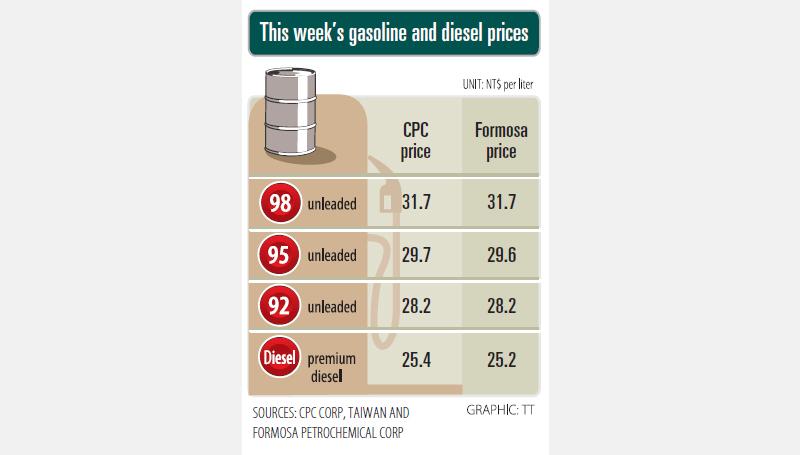CPC Corp, Taiwan (CPC, 台灣中油) and Formosa Petrochemical Corp (台塑石化) yesterday announced that they would increase gasoline and diesel prices by NT$0.3 per liter this week, the eighth weekly increase in a row.
The increases reflect last week’s higher global crude oil prices, driven by seasonal demand in the northern hemisphere and a continued decline in commercial crude inventories in the US, CPC said in a statement.
According to the state-run firm’s floating oil price formula, crude oil prices last week increased 0.57 percent from a week earlier.

OPEC and its allies were last week considering increasing production next month, which was lower than market expectations and therefore boosted market sentiment and oil prices, privately run Formosa said in a separate statement.
A standoff between OPEC+ ministers over output extended negotiations to today.
Gasoline prices at CPC stations would rise to NT$28.2, NT$29.7 and NT$31.7 per liter for 92, 95 and 98-octane unleaded gasoline respectively, while the price of premium diesel would increase to NT$25.4 per liter, the company said.
Formosa said that prices at its stations would rise to NT$28.2, NT$29.6 and NT$31.7 per liter for 92, 95 and 98-octane unleaded gasoline respectively, while the price of premium diesel would rise to NT$25.2 per liter.
Additional reporting by Bloomberg

The US dollar was trading at NT$29.7 at 10am today on the Taipei Foreign Exchange, as the New Taiwan dollar gained NT$1.364 from the previous close last week. The NT dollar continued to rise today, after surging 3.07 percent on Friday. After opening at NT$30.91, the NT dollar gained more than NT$1 in just 15 minutes, briefly passing the NT$30 mark. Before the US Department of the Treasury's semi-annual currency report came out, expectations that the NT dollar would keep rising were already building. The NT dollar on Friday closed at NT$31.064, up by NT$0.953 — a 3.07 percent single-day gain. Today,

‘SHORT TERM’: The local currency would likely remain strong in the near term, driven by anticipated US trade pressure, capital inflows and expectations of a US Fed rate cut The US dollar is expected to fall below NT$30 in the near term, as traders anticipate increased pressure from Washington for Taiwan to allow the New Taiwan dollar to appreciate, Cathay United Bank (國泰世華銀行) chief economist Lin Chi-chao (林啟超) said. Following a sharp drop in the greenback against the NT dollar on Friday, Lin told the Central News Agency that the local currency is likely to remain strong in the short term, driven in part by market psychology surrounding anticipated US policy pressure. On Friday, the US dollar fell NT$0.953, or 3.07 percent, closing at NT$31.064 — its lowest level since Jan.

The New Taiwan dollar and Taiwanese stocks surged on signs that trade tensions between the world’s top two economies might start easing and as US tech earnings boosted the outlook of the nation’s semiconductor exports. The NT dollar strengthened as much as 3.8 percent versus the US dollar to 30.815, the biggest intraday gain since January 2011, closing at NT$31.064. The benchmark TAIEX jumped 2.73 percent to outperform the region’s equity gauges. Outlook for global trade improved after China said it is assessing possible trade talks with the US, providing a boost for the nation’s currency and shares. As the NT dollar

The Financial Supervisory Commission (FSC) yesterday met with some of the nation’s largest insurance companies as a skyrocketing New Taiwan dollar piles pressure on their hundreds of billions of dollars in US bond investments. The commission has asked some life insurance firms, among the biggest Asian holders of US debt, to discuss how the rapidly strengthening NT dollar has impacted their operations, people familiar with the matter said. The meeting took place as the NT dollar jumped as much as 5 percent yesterday, its biggest intraday gain in more than three decades. The local currency surged as exporters rushed to